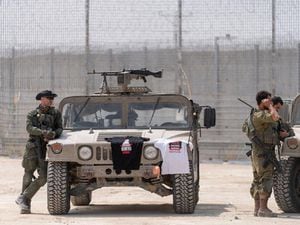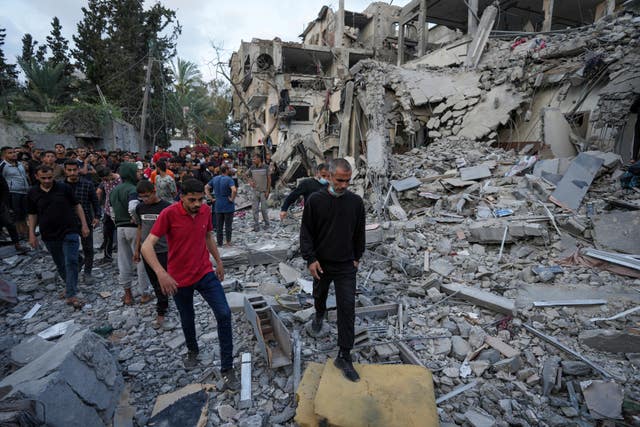Ceasefire question remains: Will Israel end war without destruction of Hamas?
Hamas is considering the latest proposal to end hostilities in Gaza, which have killed tens of thousands of Palestinians and sparked famine fears.

Hamas is considering the latest proposal for a ceasefire with Israel that the United States and other mediators hope will avert an Israeli attack on the Gaza town of Rafah.
But the chances of a deal are entangled with the question of whether Israel can accept an end to the war without reaching its stated goal of destroying Hamas.
The stakes in the ceasefire negotiations were made clear in a new UN report that said if the war in Gaza stops today, it will still take until 2040 to rebuild all the homes that have been destroyed by nearly seven months of Israeli bombardment and ground offensives in the territory.
It warned that the impact of the damage to the economy will set back development for generations and will only get worse with every month fighting continues.

The proposal that US and Egyptian mediators have put to Hamas – apparently with Israel’s acceptance – sets out a three-stage process that will bring an immediate six-week ceasefire and partial hostage release but also negotiations over a “permanent calm” that includes some sort of Israeli withdrawal from Gaza, according to an Egyptian official.
If Israel does agree to end the war in return for a full hostage release, it would be a major turnaround.
Since Hamas’ bloody October 7 attack stunned Israel, its leaders have vowed not to stop their bombardment and ground offensives until the militant group is destroyed. They also say Israel must keep a military presence in Gaza and security control after the war to ensure Hamas does not rebuild.
Publicly at least, Israeli Prime Minister Benjamin Netanyahu continues to insist that is the only acceptable endgame.
He has vowed that even if a ceasefire is reached, Israel will eventually attack Rafah, which he says is Hamas’ last stronghold in Gaza.

The deal’s immediate fate hinges on whether Hamas will accept uncertainty over the final phases to bring the initial six-week pause in fighting – and at least postpone what it is feared would be a devastating assault on Rafah, Gaza’s southernmost town where some 1.4 million Palestinians have taken refuge.
Egypt has been privately assuring Hamas that the deal will mean a total end to the war. But the Egyptian official said Hamas claims the text’s language is too vague and wants it to specify a complete Israeli pullout from all of Gaza.
The group is still studying the offer, senior Hamas official Osama Hamdan said in a message on Thursday to The Associated Press. He did not confirm whether it would formally give an answer later in the day.
On Thursday, Hamas said it was sending a delegation to Cairo to continue ceasefire talks. The group’s supreme leader, Ismail Haniyeh, said in a statement that he had spoken to Egypt’s intelligence chief and “stressed the positive spirit of the movement in studying the cease-fire proposal”.
The statement said Hamas negotiators would travel to Egypt as soon as possible “to complete the ongoing discussions with the aim of working forward for an agreement”.
The statement did not say when the delegation would travel. Hamas had been expected to deliver an answer to Egypt’s latest proposal as soon as Thursday.
Mr Blinken hiked up pressure on Hamas to accept, saying Israel had made “very important” compromises.
“There’s no time for further haggling. The deal is there,” Mr Blinken said on Wednesday before leaving for the US.
Hanging over the negotiations is the threat of an Israeli attack on Rafah, which the US and UN have warned could be catastrophic for Palestinian civilians. After fleeing Israel’s assault elsewhere in Gaza, more than half the territory’s population has crowded into tent camps and other shelters in and around Rafah.
The United States, which has staunchly supported Israel throughout the war, has said it should not move on Rafah and has grown increasingly critical of the staggering toll borne by Palestinian civilians.
American officials say they oppose a major offensive in Rafah but that if Israel conducts one, it must first evacuate civilians. Israel has said it is developing plans for a mass evacuation of civilians.
The Israel-Hamas war was sparked by the October 7 raid into southern Israel in which militants killed around 1,200 people, mostly civilians, and abducted around 250 hostages. Hamas is believed to still hold around 100 hostages and the remains of more than 30 others.
Since then, Israel’s campaign in Gaza has killed more than 34,000 Palestinians, according to local health officials.
It has wreaked vast destruction and brought about a humanitarian disaster, with several hundred thousand Palestinians in northern Gaza facing imminent famine, according to the UN. More than 80% of the population has been driven from their homes.





